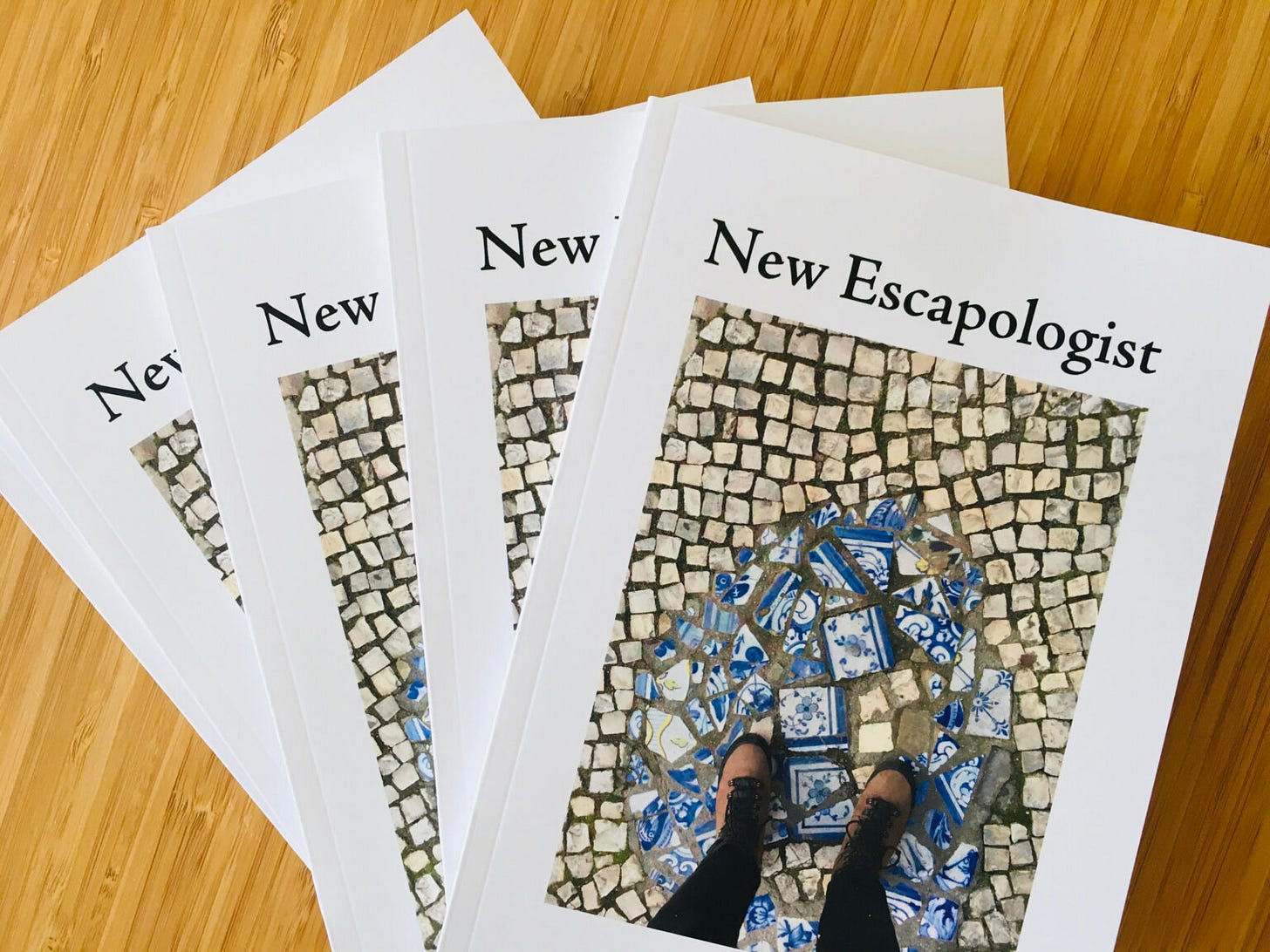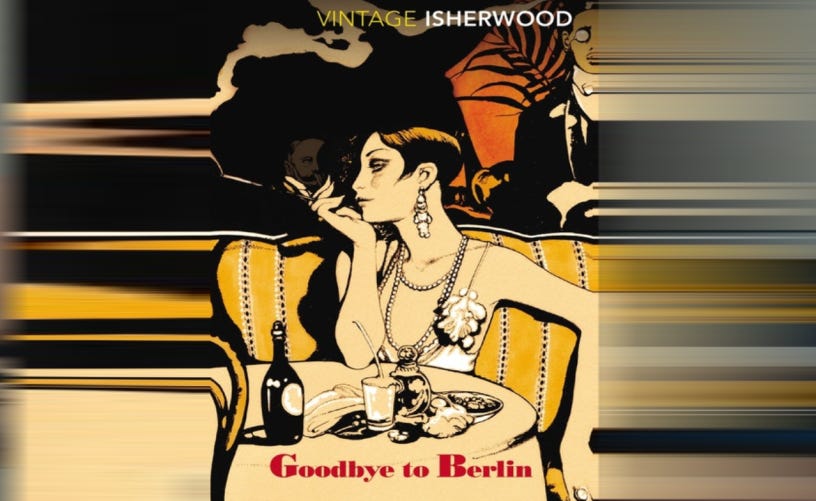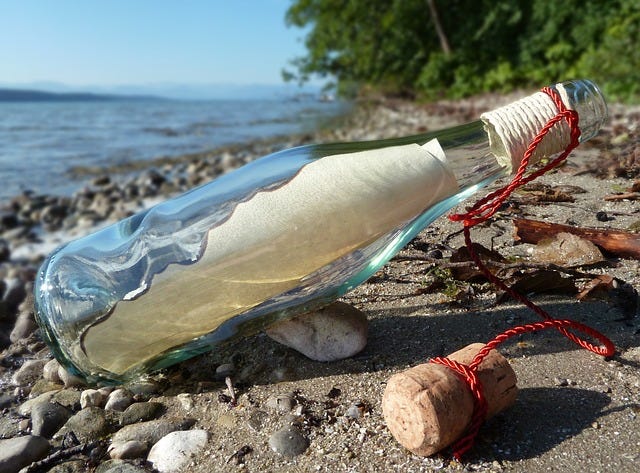Happy Monday! Welcome to New Escapologist, the free and easy newsletter from the magazine of the same name. Please use it to skive at work today and for the rest of the week. What do we like here? Creativity and fun. What don’t we like? Going to work.
Thanks to everyone who bought a book in our recent half-price sale. All orders have shipped and will be with you very soon. My storage woes are over, but you know something? It felt great to shift some units. So let’s do it again, albeit in a slightly lesser fashion.
The Good Life For Wage Slaves is half price again. Use GOOD50 at checkout.
I’m Out can’t be half price any more (I’m starting to run low), but you can have £2 off. Use OUT2 at checkout.
And I’ll kick myself for doing this, but you can also have £1 off Issue 16. Use QUID16 at checkout.
You can also use these coupons for digital editions. I want to be fair to the cyborgs among you.
The offer runs for one week. And then that’s it! Go forth. And thanks again.
No
From Girl Juice by Benji Nate:
Research
“Arts and crafts give greater life satisfaction than work,” reports the Guardian:
researchers say we could all benefit from creative endeavours and that such pursuits have a bigger influence on life satisfaction than having a job.
Gee, you think?
I’d imagine it’s because people aren’t economically bullied into knitting. Embroidery and photography don’t generally involve alienation or a commute or a barely-useful paycheque.
Last time I looked, creative hobbies arrived at under your own steam aren’t usually an insult to your very soul.
The results, [the lead researcher] added, might reflect that not everybody is in a job they find fulfilling.
Yeah.
Sleeping Coffins
My partner and I were talking to a friend recently about international travel and how the cost of accommodation is, for what you get, quite high. All an Escapologist wants is a clean bed plus a door with a lock on it, yet even at the affordable end of the scale you have to pay €40-90 per night. It becomes the main expense of travel, even though sleep is hardly what you’re travelling for.
We discussed the prospect of (we couldn’t think of another name at the time) a “sleeping coffin.” They’d be immovable coffin-like boxes, lockable from the inside, and purchasable for €7 by contactless debit card. They’d be scattered around city streets like e-scooters and locatable via an app.
My partner said it was the worst thing she’d ever heard me say.
But wait! Lets think again. With sleeping coffins, you’d be completely mobile, freer even than a snail or tortoise. You’d just turn up to a city, zero planning, confident of a secure place to sleep for barely any money. Maybe you’d bring an inflatable pillow and climb into a coffin when you run out of steam.
Faced with the prospect of a camping trip soon, I was wondering what the absolute minimum of a tent could be. I remembered the sleeping coffin and understood immediately that such a thing must surely already exist in the realms of camping.
And of course, it does:
It’s true… The bivouac sack (or “bivy” sack) is merely a weatherproof cover for your sleeping bag with a breathing hole — the perfect bear burrito, filled with your ambitions to complete those ultralight objectives.
It’s more of a body bag than a coffin. Perfect!
So, you’d pack a rolled-up sleeping bag and one of these “bear burritos” then sleep where you drop. Obviously this is intended for ramblers and adventurers rather than culture vultures like me who visit cities to see art galleries and opera. But how bad could it be? Sleeping in one of these in a cosy alley or a public park?
Well, it could be absolutely terrible, obviously. And dangerous. And yet…
He Began to Make Plans
This is from Goodbye to Berlin by Christopher Isherwood:
He began to make plans. In a few days we were all three of us to leave Berlin, for good. The Orient Express would take us to Athens. Thence, we should fly to Egypt. From Egypt to Marseilles. From Marseilles, by boat to South America. Then Tahiti. Singapore. Japan.
Now that’s an itinerary!
It calls to mind the quote from Ray Bradbury’s Dandelion Wine we used as an epigraph in Issue 1:
Where would you like to go, what would you really like to do with your life? See Istanbul, Port Said, Nairobi, Budapest. Write a book. Smoke too many cigarettes. Fall off a cliff but get caught in a tree halfway down. Get shot at a few times in a dark alley on a Moroccan midnight.
In Goodbye, the itinerary is proposed by a millionaire called Clive who seems willing to take his penniless Bohemian friends (Isherwood and “Sally Bowles,” the Liza Minelli character in Cabaret) on the journey of a lifetime to escape a Berlin about to be co-opted by the Nazis.
Clive pronounced the names as though they had been stations on the Wannsee railway, quite as a matter of course; he had been there already. He knew it all. His matter-of-fact boredom gradually infused reality into the preposterous conversation. After all, he could do it. I began seriously to believe that he meant to do it. With a mere gesture of his wealth, he could alter the whole course of our lives.
Sometimes all you need is money. But for the rest of us, there’s wit.
A Wake-Up Call
Thanks to everyone who emailed to tell me about Denise Prudhomme, who died while working for a huge corporation.
What Prudhomme’s death at her desk triggered is a stark reminder that life is short, and raises the bigger question of whether we are wasting precious time working for large companies who, at the end of the day, don’t notice if an employee dies at their desk for four days. In a year filled with headlines of tech layoffs where huge corporations continue to put profit over people and corporate America wrestles with return-to-office mandates that employees are outright rejecting, Prudhomme’s death might be the event that pushes many to leave the rat race.
The linked article (from Forbes no less – Forbes!) slams big companies for working their employees literally to death, then tells of new trends in people waking up to life being short and escaping The Trap while they can. A third of British women, for example, plan to quit work before retirement, in part because of work’s insensitivity to the menopause but also due to a growing “collective rejection of the notion that only one kind of career path and one kind of job offers stability.”
Which, of course, is wonderful news. The media talk about the Great Resignation but maybe it should be called the Great Awakening as more and more people wake up from the spell and come to their senses.
[Prudhomme’s] experience highlights a stark truth: that we really are just a number to the place where we spend the majority of our waking hours. The harsh reality is that we are spending our time and energy in the wrong place for the wrong people. For many, Prudhomme’s death is a wake-up call to make changes while they still can. And that’s a special legacy to leave.
On Self-Help and Making the Bed
Every day, I make the bed.
It’s not a particularly onerous task and it can even be a pleasant one if seen the right way, but I always feel slightly irritated by having to do it. We’ll come back to that in a minute.
There’s a self-help book called Make Your Bed and I occasionally think about reading it. I’ve really had my fill of self-help though. While it’s sometimes enlightening, one only needs so much enlightenment.
I’d rather read novels. I see fiction as something (top-tier life) and non-fiction as about something (second-tier life), self-help being almost a third tier.
I have no idea what the Make Your Bed book is about, but I assume it tells you to make your bed because making your bed (a) doesn’t take very long, (b) makes a big difference to the vibe of where you live, (c) is actually quite pleasant and mindful if you allow it to be, and (d) acts as a mild physical warm-up for doing other things. I assume it is a metaphor for (a) tasks seldom being as bad as you imagine, (b) choosing your battles, (c) seeing things different ways, and (d) how activity can snowball once you’ve begun.
I will never look up that book to find what it’s really about. I have not read the review I linked to above. If you’ve read it though, please tell me how right or wrong I am.
Anyway, those are some of the things I think about when making the bed. But why the slight sense of irritation at having to do it?
There’s another self-help book on the market at the moment with an ‘escape’ theme, just right for us to review in the next New Escapologist. I can’t be bothered though, so I asked someone else to do it for me. Thanks, Arie!
Arie came through with his review and, among other things, it describes a way to overcome stress. You want to be “there,” when in fact you’re “here” is the explanation. Once you’ve accepted that, you’re on your way to overcoming stress.
Procrastinating slightly from making the bed this morning, I considered this. Why don’t I want to make the bed? It’s because I find it slightly stressful. Why do I find it slightly stressful when everything about making the bed is actually pretty good? It’s because I want to be “there” (a tidy world where the bed is made) instead of “here” (a messy world where the bed is unmade) and I can’t get “there” quickly enough.
Once I’d understood that, I asked myself why it’s so undesirable to live “here” in the messy world. It’s not so undesirable really. So I got breakfast and made the bed later instead. I did not feel the stress of the “make the bed” task hanging over me as I ate my breakfast. It works!
And I didn’t even have to read a self-help book. Though admittedly I had a unique way of learning from it anyway. Sorry Arie.
In That Moment, A Seed Was Planted
Because I’m a tantrum-prone baby, I mostly think and talk about total escapes from wage slavery.
This guy, however, reminds us that we don’t have to be so drastic if or when it doesn’t suit us.
We can simply change jobs — maybe escape the stultification of white-collar work — if we want to:
one day, a window cleaner came to the office. I completely lost track of time watching him work. When I finally snapped out of it, I told him it looked like a peaceful job.
Yes, I can’t imagine a better job, he replied cheerfully.
In that moment, a seed was planted. Six months later, I was on a plane to Bangkok for a sabbatical in Asia
Pause. Take a break. Reassess. Do something else. Serial monogamy for work.
Nature is Not In It
This is Enrico Monacelli writing in the Quietus last year about the previously mentioned After Work by Helen Hester and Nick Srnicek:
Work sucks. It just does. Especially in the state that we’re in: a good job is harder and harder to come by. Let alone a good job that gives you the time and means to enjoy all the things that make a life worth living: a nice place to rest your head, quality time with those you love and free time to idly cultivate those very talents and aspirations that makes you human in the first place. More and more people feel like life is being sucked out of them just to get by. Work lingers throughout each aspect of our daily life like a horrid Thing that gnaws at our very vitality.
and
A job is a way to force you to schedule your hours and organize your life entirely around capitalism’s every demand, leaving no space to your autonomous ability to enjoy or do whatever you like. There’s no pointing in reforming work or creating better jobs then: an oppressive system of total domination remains an oppressive system of total domination no matter how much you ameliorate it.
That’s true!
That’s Just What We’re Going to Do
I noticed today that the ‘about’ text at our Substack is old. I wrote it almost two years ago when I was re-launching the magazine.
I’ve updated it now but let’s have a quick look at the expired text to archive and reflect upon it.
New Escapologist was a small press magazine for over a decade, beginning with a pilot issue in 2007 and ending with a chunky final edition in 2017. Since then, I’ve kept the spirit alive with a blog (digested monthly in this newsletter), a column in the Idler, and two books.
Hah. “Final edition.” Whenever New Escapologist was spoken about in the past tense (between 2017 and 2023), it gave me a pang of mild sadness. That alone wasn’t enough to bring it back, but I’m glad it’s back.
The theme of this franchise has been escape, typically from the alienating concerns of work and consumerism, with a sense of style and grace and humour.
I’d like to cover more kinds of escape than the escapes from work and consumer culture. I already know that Issue 17 will see some examples of that.
Over the years, New Escapologist saw contributions from Alain de Botton, Caitlin Doughty, Mr Money Mustache, Will Self, and Tinky Actual Winky from Teletubbies. Most importantly, we published over 200 essays designed to temper the work ethic.
And with two interviews per issue now plus a roster of columnists, we’re attracting more prominent citizens than ever before. Famous names is no reason to buy the magazine. But the thoughtful things these cherrypicked favourites happen to say is a good reason to buy the magazine.
In 2023, it’s clearer than ever that “honest hard work” is not the answer to poverty, loneliness, boredom or ill health.
And in 2024 it’s clearer still. Recent news stories include a “presenteeism epidemic,” people being unable to afford sick leave, graduates who’d be better off if they hadn’t gone to university, and a cleaner sacked for eating a sandwich.
Moreover, people are questioning the primacy of centralised digital platforms.
Also in recent news is the analysis of how social media enabled far-right riots across the UK.
The time is ripe to bring the mag back! So that’s just what we’re going to do.
We’ll do it again too. Now that we’re approaching the end of the four-issue cycle funded by last year’s Kickstarter, I’m looking into the practicalities of bringing the mag “back” yet again, with or without another hiatus. By all means let me know your thoughts.
Letter to the Editor: Right Where I Itch
To send a letter to the editor, simply write in. You’ll get a reply and we’ll anonymise any blogged version.
Reader U writes:
I’m a new subscriber and after reading Issue 16 I have to say this Henry Gibbs fella is scratching me right where I itch. How can I read more of his notes?
He reminds me of Mark Boyle, whose The Way Home: A Life Without Technology is certainly worth a read.
Kind regards,
U
*
Thanks!
He’s the real deal, our Henry. His column appears in Issues 14, 15, 16 and (this coming December) 17.
14 is available only in digital;
15 is available in digital, but if you wait there will be some shop returns;
16 is still available in print;
17 will be available to pre-order next month.
We like Mark Boyle here at the magazine too, and I happen to know that The Way Home is one of the few books Henry himself owns a copy of.
That’s all for another month. Thank you once again for your time and attention. Remember to treat yourself to a book or an Issue 16 in our extended sale or, if you don’t want one, Issue 17 is practically just around the corner.
Your friend and neighbour,
Robert Wringham
www.newescapologist.co.uk









Thank you kindly, sir, I have purchased both books with my last £16.50 of my wages.
I’m reading “I’m out” right now and I felt compelled to share my Substack post “Work is weird”. It’s an outpouring of my dissatisfaction of being an employee. https://open.substack.com/pub/slart/p/work-is-weird?r=837k2&utm_medium=ios